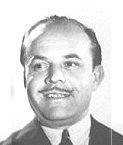Exotica through the years, Part 2: Perry Como and Tony Martin
As Rose Room is to How High the Moon, Temptation is to Misirlou. What, you may wonder, am I talking about?
Well, according to Alec Wilder, Art Hickman's 1919 Rose Room was one of the jazz-improvisational vehicles of choice in the days before High High the Moon (1933), and for the same reason: its chords are constantly in motion. Nothing like the nonstop modulation that is Moon, but Hickman's tune accomplishes nearly as much, and with considerably crater economy. I mean, greater. Similarly, Temptation provided pop music listeners with the Misirlou scale (the name of which I forget) before the tune of that same name hit the pop charts, and without stating that mode as explicitly. In fact, Temptation's exotica-cliche I/bII chord change serves as a sort of cover for the scale's lowered 2nd and 6th. Tunewriter Nacio Herb Brown's 1929 Singing in the Rain is better-regarded by pop song historians, but we think they're all wet. Perry Como's hit 1945 recording really emphasizes the Misirlou nature of the song, thanks to Ted Steele's over-the-top-and-then-some arrangement:
Temptation (Brown--Freed), Perry Como with Ted Steele and His Orch. (1945).
And here's a more mellow--but far from dull--semi-Classical rendition from 1945, courtesy of my favorite such conductor, Morton Gould:
Temptation (Brown--Freed), Morton Gould and His Orch., 1945. (Orig. from 78 set, After Dark.)
Speaking of mellow, not to mention moody and melancholy, here are Tony Martin and David Rose with a subtle and spooky turn at Taboo:
Taboo (Margarita Lecuona--S.K. Russell), Tony Martin, with David Rose and His Orchestra, 1941.
Possibly the only thing less likely than exotica from Jesse Crawford (besides exotica from Perry Como, which we've already heard) is killer exotica from Jesse Crawford. But that's just what we're about to hear--expert and earnest Ernesto Lecuona on the Wurlitzer:
Siboney (Ernesto Lecuona--Theodora Morse), Jesse Crawford, Wurlitzer organ, 1931.
More pop exotica to come. Actually, exotica is already pop, so "pop" pop exotica might be the term I'm looking for. (To hyphenate or not to hyphenate? That-is-the-question.)

"Alec Wilder--who's that?"--Nacio Herb Brown, only one of whose songs is mentioned, none too positively, in Alec Wilder's American Popular Song.
Lee
Well, according to Alec Wilder, Art Hickman's 1919 Rose Room was one of the jazz-improvisational vehicles of choice in the days before High High the Moon (1933), and for the same reason: its chords are constantly in motion. Nothing like the nonstop modulation that is Moon, but Hickman's tune accomplishes nearly as much, and with considerably crater economy. I mean, greater. Similarly, Temptation provided pop music listeners with the Misirlou scale (the name of which I forget) before the tune of that same name hit the pop charts, and without stating that mode as explicitly. In fact, Temptation's exotica-cliche I/bII chord change serves as a sort of cover for the scale's lowered 2nd and 6th. Tunewriter Nacio Herb Brown's 1929 Singing in the Rain is better-regarded by pop song historians, but we think they're all wet. Perry Como's hit 1945 recording really emphasizes the Misirlou nature of the song, thanks to Ted Steele's over-the-top-and-then-some arrangement:
Temptation (Brown--Freed), Perry Como with Ted Steele and His Orch. (1945).
And here's a more mellow--but far from dull--semi-Classical rendition from 1945, courtesy of my favorite such conductor, Morton Gould:
Temptation (Brown--Freed), Morton Gould and His Orch., 1945. (Orig. from 78 set, After Dark.)
Speaking of mellow, not to mention moody and melancholy, here are Tony Martin and David Rose with a subtle and spooky turn at Taboo:
Taboo (Margarita Lecuona--S.K. Russell), Tony Martin, with David Rose and His Orchestra, 1941.
Possibly the only thing less likely than exotica from Jesse Crawford (besides exotica from Perry Como, which we've already heard) is killer exotica from Jesse Crawford. But that's just what we're about to hear--expert and earnest Ernesto Lecuona on the Wurlitzer:
Siboney (Ernesto Lecuona--Theodora Morse), Jesse Crawford, Wurlitzer organ, 1931.
More pop exotica to come. Actually, exotica is already pop, so "pop" pop exotica might be the term I'm looking for. (To hyphenate or not to hyphenate? That-is-the-question.)

"Alec Wilder--who's that?"--Nacio Herb Brown, only one of whose songs is mentioned, none too positively, in Alec Wilder's American Popular Song.
Lee


0 Comments:
Post a Comment
<< Home